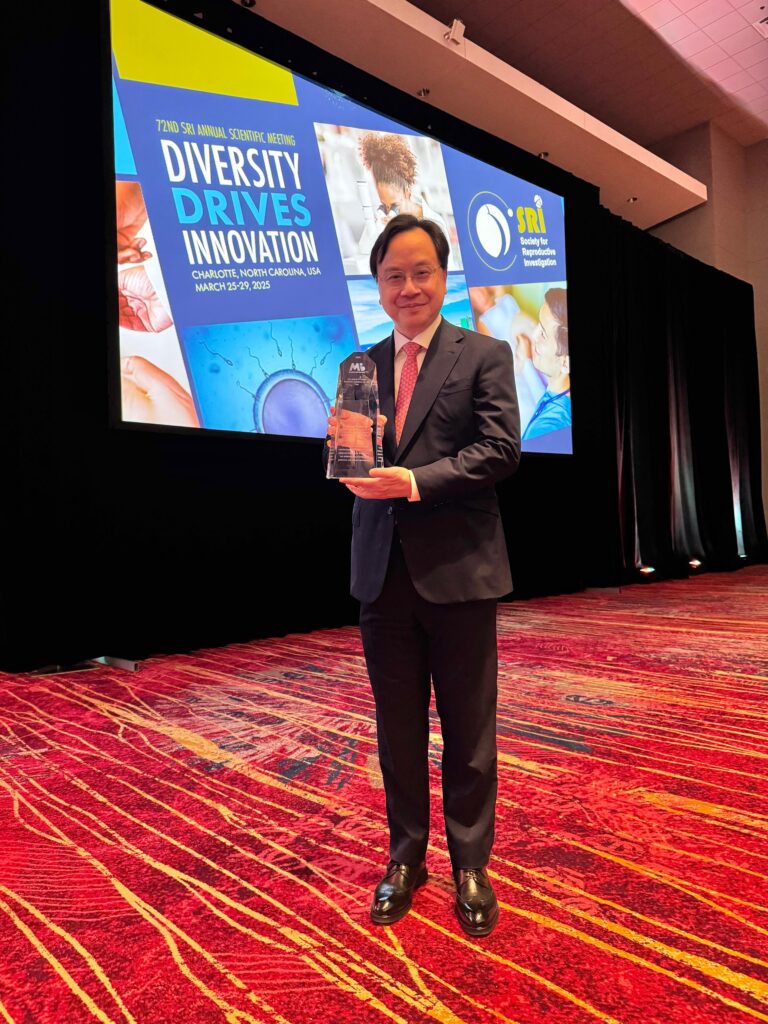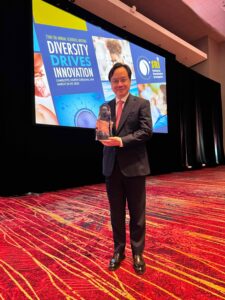CUHK
News Centre
CUHK Vice-Chancellor and President Professor Dennis Lo Yuk-ming
honoured by March of Dimes with the 2025 Richard B. Johnston, Jr., MD Prize
Professor Dennis Lo Yuk-ming, Vice-Chancellor and President of The Chinese University of Hong Kong (CUHK), has recently been awarded the 2025 Richard B. Johnston, Jr., MD Prize in Developmental Biology by March of Dimes, a leading organisation in the United States that works to improve the health of mothers and babies. Professor Lo was honoured for the revolutionary contributions he made to medical science by discovering cell-free fetal DNA in maternal blood and developing non-invasive prenatal testing (NIPT). Professor Lo is the first Chinese scientist to receive this prestigious award since it was established in 1996.
The annual award recognises outstanding researchers who have made significant advancements in science related to pregnancy, birth and prenatal development. To date, eight of the recipients have gone on to win the Nobel Prize in Physiology or Medicine.
Professor Lo said: “I am deeply honoured to receive this award from March of Dimes. This is a great encouragement for my scientific research. Witnessing non-invasive prenatal testing become the standard of care for expectant mothers throughout the world has been the privilege of my lifetime. I will continue to collaborate with global research peers to translate cutting-edge scientific achievements into clinical applications, contributing to the advancement of global healthcare.”
Dr Emre Seli, Chief Scientific Advisor at March of Dimes, highly commended Professor Lo’s achievements. He emphasised that over the past 15 years, Professor Lo’s research accomplishments have had a far-reaching impact on the world and have made tremendous contributions to improving maternal and infant health worldwide.
Known as “the father of non-invasive prenatal testing”, Professor Lo is the Vice-Chancellor and President and also the Li Ka Shing Professor of Medicine of CUHK. He joined CUHK in 1997 and reported the presence of cell-free fetal DNA in maternal plasma the same year. He and his colleagues have been instrumental in transforming non-invasive DNA-based prenatal testing for Down syndrome into a clinical reality. It has now been adopted in more than 100 countries and has been used by over 100 million pregnant women. Furthermore, Professor Lo has developed genome-wide genetic and epigenetic approaches that facilitate the early detection of multiple types of cancer, propelling cancer liquid biopsy into the era of genome-wide analysis.
In recognition of his outstanding work, Professor Lo has received numerous international honours and awards. He was elected a Fellow of the Royal Society in 2011 and an International Member of the US National Academy of Sciences in 2013; and received the 2014 King Faisal International Prize for Medicine. In 2016, Professor Lo was selected as the winner of the inaugural Future Science Prize in Life Science, regarded as China’s Nobel Prize. In the same year, he was named the Thomson Reuters Citation Laureate in Chemistry, an honour considered as a predictive index of the Nobel Prize. In 2021, he received the Breakthrough Prize in Life Sciences, widely known as the “Oscars of Science”, and became the first Chinese scientist to receive the Royal Medal in biological sciences from the Royal Society of London. In 2022, he was awarded the Lasker-DeBakey Clinical Medical Research Award, the US’s top biomedical research prize. In 2024, he became the first Chinese scholar to receive the prestigious Jiménez Díaz Lecture Award.



